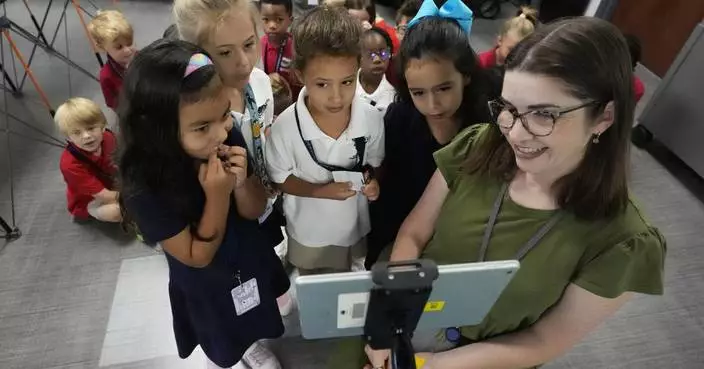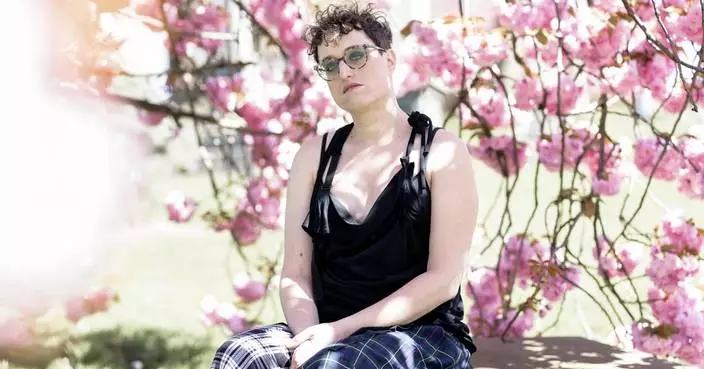Judith Sheindlin has been the sole judge, jury and verbal executioner for the last quarter century on her behemoth TV court show, “Judge Judy.” Her trusted bailiff, Petri Hawkins Byrd, has stood by her side during approximately 12,500 cases, and remembers an instance when he thought she got it wrong.
“I told her how I felt about it. And I remember she looked at me and she said, ‘Really, Byrd? You really think that I got it wrong?’” Byrd recalled, remembering Sheindlin's stern look. “I felt the need to tell her that there was something that she missed.”
Click to Gallery
Judith Sheindlin has been the sole judge, jury and verbal executioner for the last quarter century on her behemoth TV court show, “Judge Judy.” Her trusted bailiff, Petri Hawkins Byrd, has stood by her side during approximately 12,500 cases, and remembers an instance when he thought she got it wrong.
Byrd says that moment sticks out because of its rarity; he only remembers feeling that way one other time on the show. Arguably the most recognizable bailiff in court TV history, he’s the only officer the show has known. But after 25 years, his time — and the show— will end this season.
Millions of viewers have been educated in courtroom etiquette and legal terminology through the show that at one time beat the legendary “The Oprah Winfrey Show” in the ratings and will close as one of the most successful daytime shows in TV history.
The coronavirus pandemic, which halted television production this spring, has changed the show. New episodes are taped without an audience, a noticeable difference as Sheindlin’s jokes — and occasional dressing-down of litigants — aren’t supported with giggles from the TV crowd. Byrd no longer passes evidence to the judge; it's kept at the podiums as cameras zoom in tightly, a symbol of coronavirus protocols.
At 62, Byrd considers the world his oyster as he moves into a new chapter: He sings, has film and TV credits and is also focused on building a following for his own Instagram Live show that he hosts with his wife, titled “Bonding with Byrd.”
Byrd, referred to as Officer Byrd on the show, says he doesn’t remember the specific case but the judge recalled it. “She said, ‘My officer said that there was something that you said that you pointed out in your testimony.’ And I believe she reversed the decision on that one.”
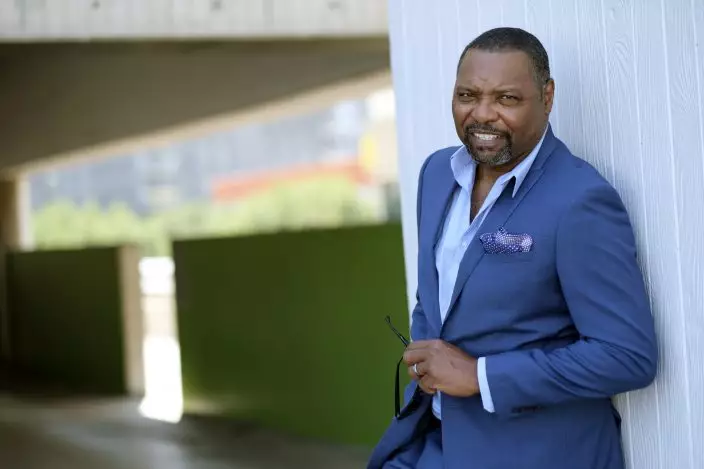
Petri Hawkins Byrd, bailiff on the reality court television program "Judge Judy," poses for portrait, Friday, Sept. 25, 2020, in Los Angeles. (AP PhotoChris Pizzello)
Byrd says that moment sticks out because of its rarity; he only remembers feeling that way one other time on the show. Arguably the most recognizable bailiff in court TV history, he’s the only officer the show has known. But after 25 years, his time — and the show— will end this season.
It may have been that same natural urge to speak up that got him hired. Byrd, a bailiff, and the judge worked together in the New York City court system in the late 80s. In 1995, after learning that Sheindlin was getting a TV show, Byrd wrote her a congratulatory letter and jokingly added that he was available for work. When the synergy with an actor during a test shoot wasn’t to Sheindlin's liking, she reached out to Byrd.
“I think she was nervous about doing this Hollywood thing. It was something out of her wheelhouse,” Byrd said. “To have a Brooklyn born, fellow Brooklynite start this adventure with her and somebody who knew how she was…I think that made her feel comfortable. “
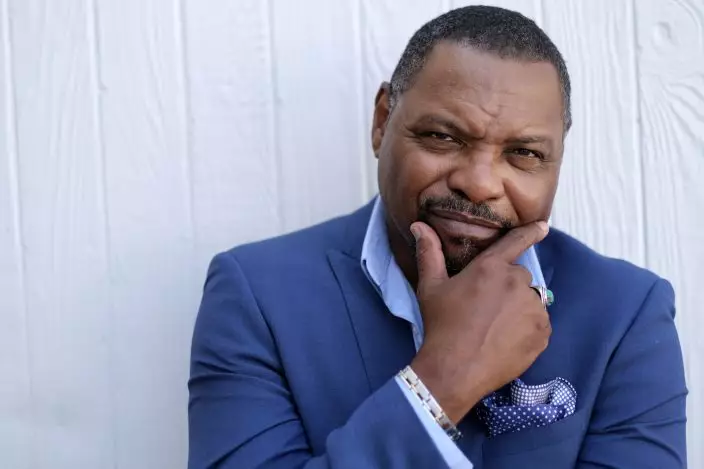
Petri Hawkins Byrd, bailiff on the reality court television program "Judge Judy," poses for portrait, Friday, Sept. 25, 2020, in Los Angeles. (AP PhotoChris Pizzello)
Millions of viewers have been educated in courtroom etiquette and legal terminology through the show that at one time beat the legendary “The Oprah Winfrey Show” in the ratings and will close as one of the most successful daytime shows in TV history.
Viewers have seen Byrd calling the court to order, helping the judge with math problems and escorting unruly litigants out of the courtroom. Byrd says Sheindlin’s appeal was her King Solomon-like fairness and consistency.
“When we started, there was like our court show, maybe one other court show and a plethora of talk shows. And those talk shows kind of exploited people’s foibles … I think America, in particular, was looking for answers, or they were looking for somebody to be able to stand up and say, ’Hey, let’s call a spade a spade,'” Byrd said. “I think that’s what’s kept our show in the forefront. We haven’t changed the set. The only thing that’s changed in almost 25 years is Judy’s hairstyle.”
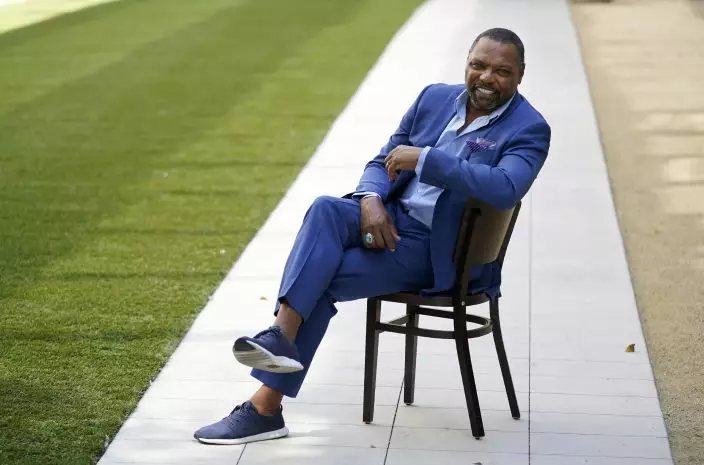
Petri Hawkins Byrd, bailiff on the reality court television program "Judge Judy," poses for portrait, Friday, Sept. 25, 2020, in Los Angeles. (AP PhotoChris Pizzello)
The coronavirus pandemic, which halted television production this spring, has changed the show. New episodes are taped without an audience, a noticeable difference as Sheindlin’s jokes — and occasional dressing-down of litigants — aren’t supported with giggles from the TV crowd. Byrd no longer passes evidence to the judge; it's kept at the podiums as cameras zoom in tightly, a symbol of coronavirus protocols.
Byrd says he doesn’t watch episodes but occasionally catches them playing in the waiting room during visits to the doctor. Hilariously outed by social media for playing crossword puzzles as cases are tried, he’s substituted passing the time with something more pressing: mapping out his future.
“There are times when I’m looking and I’m thinking about a case and I’m listening to it and I’m thinking, ‘Man, this might be a case more so for mediation than arbitration…maybe there’s a show here and maybe a certain bailiff who has sat under the tutelage of a certain famous judge (who) could mediate these cases himself,” Byrd said. “There’s a bunch of things going on in that brain while I’m there listening to cases.”
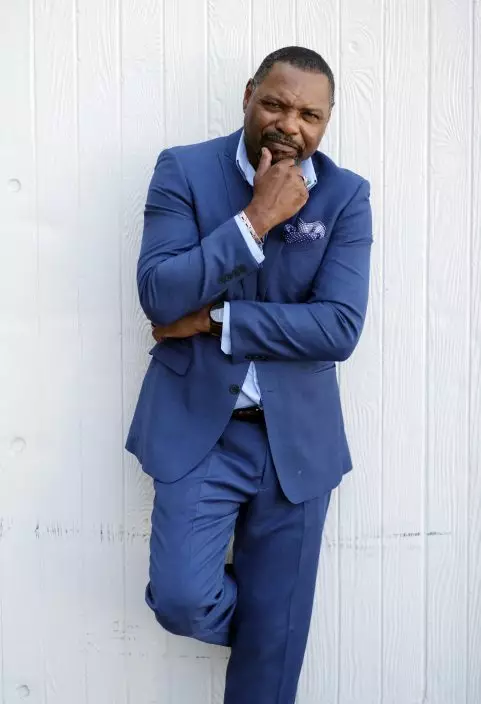
Petri Hawkins Byrd, bailiff on the reality court television program "Judge Judy," poses for portrait, Friday, Sept. 25, 2020, in Los Angeles. (AP PhotoChris Pizzello)
At 62, Byrd considers the world his oyster as he moves into a new chapter: He sings, has film and TV credits and is also focused on building a following for his own Instagram Live show that he hosts with his wife, titled “Bonding with Byrd.”
Sheindlin said in a statement that it's been fun having Byrd “along on this journey.”
“He is a consummate professional who knows how a courtroom should be run," she said. “Byrd has a great voice, is a terrific storyteller and is generous with his time and talent to many worthy organizations.”
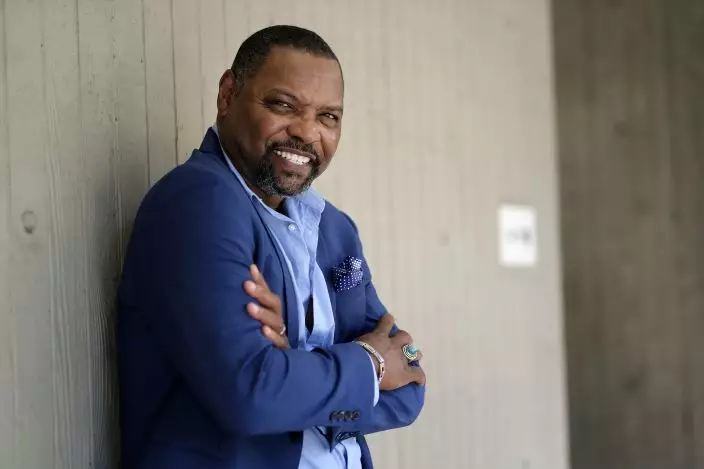
Petri Hawkins Byrd, bailiff on the reality court television program "Judge Judy," poses for portrait, Friday, Sept. 25, 2020, in Los Angeles. (AP PhotoChris Pizzello)
Sheindlin recently announced she’s taking her gavel to Amazon Studios for an exclusive, unnamed U.S. show on IMDb TV. There’s no word on if Byrd will join her, but he says he’d be ‘honored’ if there’s room for him. If not, he has no complaints.
“I’ve gotten a chance to fulfill a lot of dreams that I probably wouldn’t have gotten the chance to do if it hadn’t been for Judge Judy Sheindlin taking very seriously a funny comment at the end of a letter,” Byrd said. “It just goes to show you that if you want to make God laugh, just tell him your plans. And then he’ll go, ‘You have no idea what you’re about to embark on.’ But I trust God and I trust the ride, and the process has been wonderful.”
NEW YORK (AP) — The New York Times and The Washington Post were awarded three Pulitzer Prizes apiece on Monday for work in 2023 that dealt with everything from the war in Gaza to gun violence, and The Associated Press won in the feature photography category for coverage of global migration to the U.S.
Hamas’ Oct. 7 attack on Israel and its aftermath produced work that resulted in two Pulitzers and a special citation. The Times won for text coverage that the Pulitzer board described as “wide-ranging and revelatory,” while the Reuters news service won for its photography. The citation went to journalists and other writers covering the war in Gaza.
The prestigious public service award went to ProPublica for reporting that “pierced the thick wall of secrecy” around the U.S. Supreme Court to show how billionaires gave expensive gifts to justices and paid for luxury travel. Reporters Joshua Kaplan, Justin Elliott, Brett Murphy, Alex Mierjeski and Kirsten Berg were honored for their work.
The Pulitzers honored the best in journalism from 2023 in 15 categories, as well as eight arts categories focused on books, music and theater. The public service winner receives a gold medal. All other winners receive $15,000.
The 15 photos in AP’s winning entry were taken across Latin America and along the U.S.-Mexico border in Texas and California in a year when immigration was one of the world’s biggest stories. They were shot by AP staffers Greg Bull, Eric Gay, Fernando Llano, Marco Ugarte and Eduardo Verdugo, and longtime AP freelancers Christian Chavez, Felix Marquez and Ivan Valencia.
“These raw and emotional images came about through day-to-day coverage of a historic moment in multiple countries documenting migrants at every step of their treacherous journeys,” said Julie Pace, the AP’s senior vice president and executive editor.
The United States has seen more than 10 million border arrivals in the last five years, with migrants arriving from a wide range of new locations like Venezuela, Cuba, Ecuador, Haiti and African countries, in contrast with earlier eras.
The AP has won 59 Pulitzer Prizes, including 36 for photography. The news cooperative was named a finalist for the national reporting Pulitzer on Monday for its coverage of hundreds of thousands of children who disappeared from public schools during the pandemic.
In citing the Times for its work in Israel and Gaza, the Pulitzer board mentioned its coverage of the country’s intelligence failures, along with the attack and Israel’s military response.
The award comes even as The Times has faced some controversy about its coverage; last month a group of journalism professors called on the publication to address questions about an investigation into gender-based violence during the Hamas attack on Israel.
The Times’ Hannah Dreier won a Pulitzer in investigative reporting for her stories on migrant child labor across the United States. Contributing writer Katie Engelhart won the newspaper’s third Pulitzer, in feature writing, for her portrait of a family struggling with a matriarch’s dementia.
“Every one of the winners and finalists showcases a drive for original, revelatory reporting that underpins so much of what we produce, from the biggest storylines in the news to feature writing as well as classic investigations,” said Joe Kahn, the Times' executive editor.
The Washington Post staff won in national reporting for its “sobering examination” of the AR-15 semi-automatic rifle, which came with some gut-wrenching photos. “We were eager to find a way to cover it differently and change the conversation about mass shootings,” Peter Walstein, the Post’s senior national enterprise editor, said in the newspaper.
The Post’s David E. Hoffman won in editorial writing for a “compelling and well-researched” series on how authoritarian regimes repress dissent in the digital age. Its third award went to contributor Vladimir Kara-Murza, for commentaries written from a Russian prison cell.
The New Yorker magazine won two Pulitzers. Sarah Stillman won in explanatory reporting for her report on the legal system’s reliance on felony murder charges. Contributor Medar de la Cruz won in illustrated reporting and commentary for his story humanizing inmates in the Rikers Island jail in New York City.
The staff of Lookout Santa Cruz in California won in the breaking news category for what the prize board called “nimble community-minded coverage” of flooding and mudslides. On its website Monday, Lookout Santa Cruz said that it made its coverage free at a time of crisis in the community, and also used text messages to reach people without power.
“In short, we did our jobs,” the staff said in an unsigned article, “and we heard so many thanks for it. The Pulitzer is icing on that cake.”
The Pulitzers gave a second award in national reporting to the Reuters staff for an “eye-opening” series that probed Elon Musk’s automobile and aerospace businesses.
In local reporting, Sarah Conway of City Bureau and Trina Reynolds-Tyler of the Invisible Institute won for an investigative series on missing Black girls and women in Chicago, which showed how racism and the police contributed to the problem.
The Pulitzer in criticism went to Justin Chang of The Los Angeles Times for evocative and genre-spanning coverage of movies. The Pulitzer board's second special citation went to the late hip-hop critic Greg Tate.
The awards are administered by Columbia University in New York, which itself has been in the news for student demonstrations against the war in Gaza. The Pulitzer board met away from Columbia this past weekend to deliberate on its winners.
The Pulitzers announced that five of the 45 finalists this year used artificial intelligence in research and reporting of their submissions. It was the first time the board required applicants for the award to disclose use of AI.
The prizes were established in the will of newspaper publisher Joseph Pulitzer and first awarded in 1917.
David Bauder writes about media for The Associated Press. Follow him at http://twitter.com/dbauder.

Hannah Dreier, second from right, as colleagues applaud during a Pulitzer Prize gathering in the newsroom of The New York Times in New York, Monday, May 6, 2024. Dreier won a Pulitzer in investigative reporting for her stories on migrant child labor across the United States. (Hiroko Masuike/The New York Times via AP)
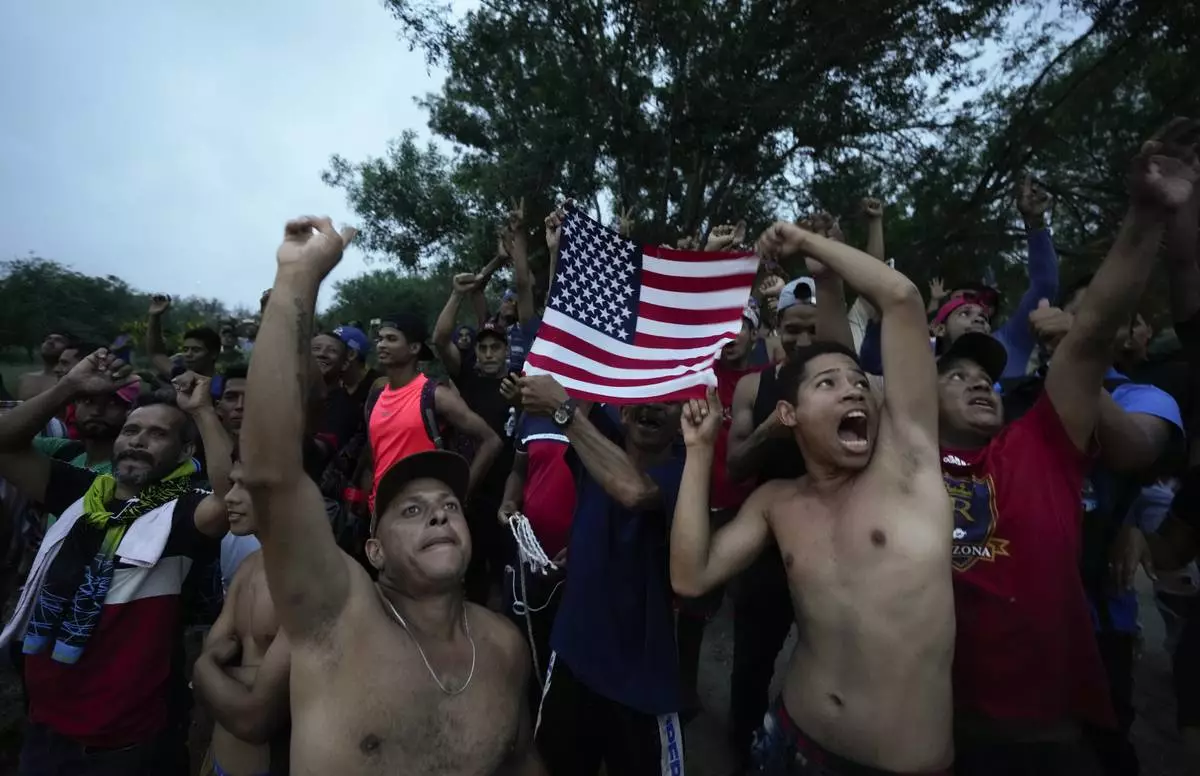
Venezuelan migrants wave a U.S. flag at a television helicopter that flew over the Rio Grande, in Matamoros, Mexico, Friday, May 12, 2023, a day after pandemic-related asylum restrictions called Title 42 were lifted. The image was part of a series by Associated Press photographers Ivan Valencia, Eduardo Verdugo, Felix Marquez, Marco Ugarte Fernando Llano, Eric Gay, Gregory Bull and Christian Chavez that won the 2024 Pulitzer Prize for feature photography. (AP Photo/Fernando Llano)

A woman carries her child after she and other migrants crossed the Rio Grande and entered the U.S. from Mexico, to be processed by U.S. Customs and Border Protection, Saturday, Sept. 23, 2023, in Eagle Pass, Texas. The image was part of a series by Associated Press photographers Ivan Valencia, Eduardo Verdugo, Felix Marquez, Marco Ugarte Fernando Llano, Eric Gay, Gregory Bull and Christian Chavez that won the 2024 Pulitzer Prize for feature photography. (AP Photo/Eric Gay)
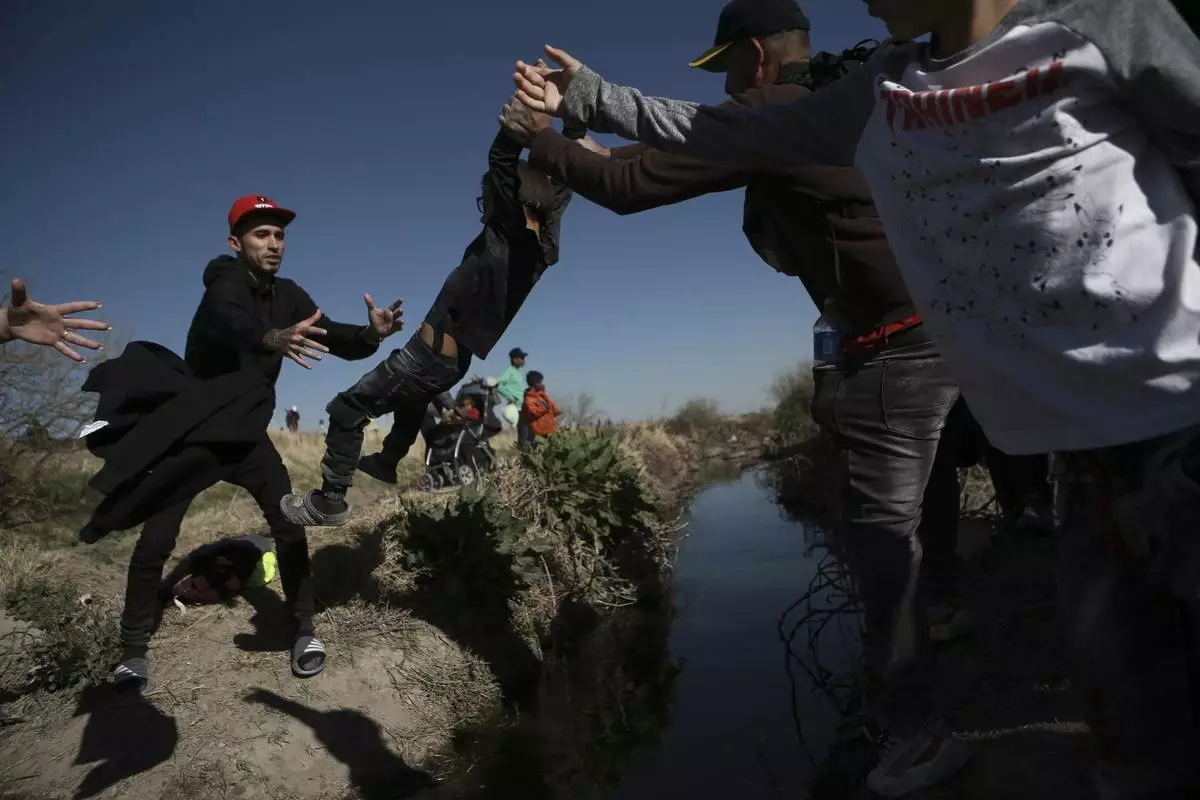
Migrants cross the Rio Grande river into the United States from Ciudad Juarez, Mexico, Wednesday, March 29, 2023. The image was part of a series by Associated Press photographers Ivan Valencia, Eduardo Verdugo, Felix Marquez, Marco Ugarte Fernando Llano, Eric Gay, Gregory Bull and Christian Chavez that won the 2024 Pulitzer Prize for feature photography. (AP Photo/Christian Chavez)
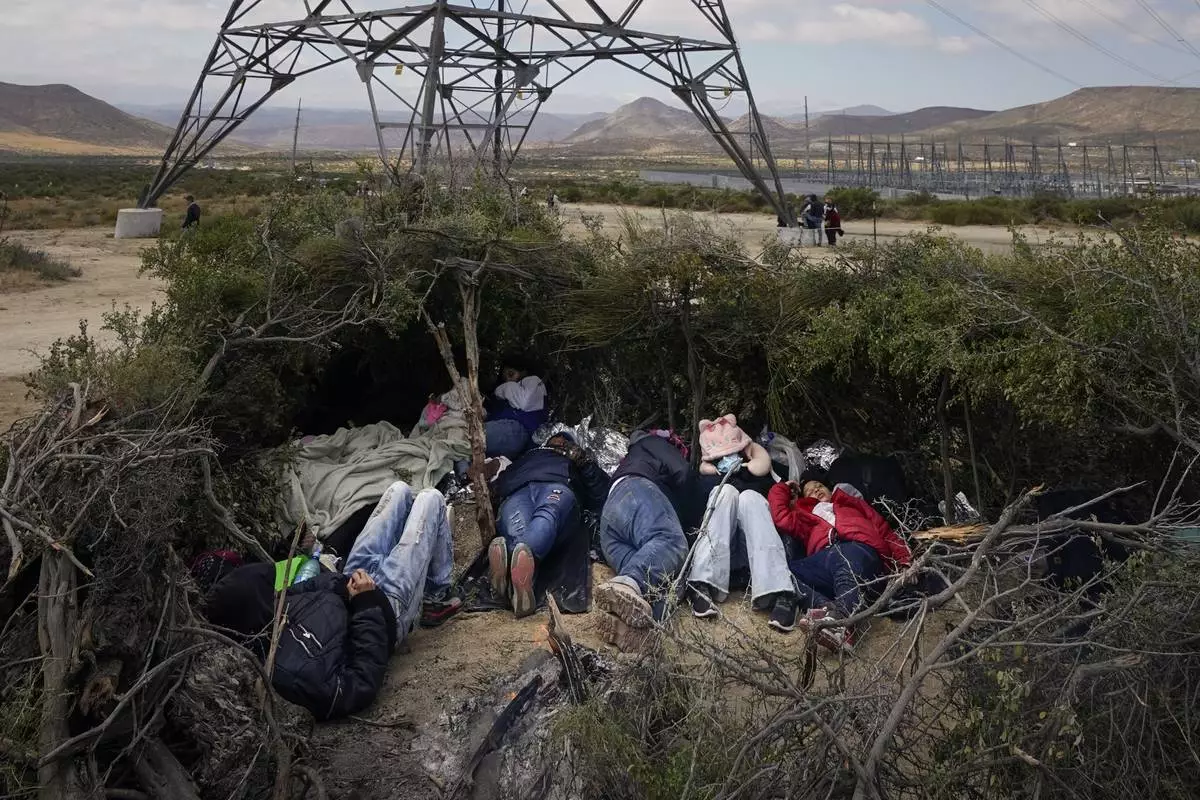
A group of migrants sleep in a makeshift campsite as they wait to apply for asylum after crossing the border, Wednesday, May 10, 2023, near Jacumba, Calif. The group had been camping just across the border for days, waiting to apply for asylum in the United States. The image was part of a series by Associated Press photographers Ivan Valencia, Eduardo Verdugo, Felix Marquez, Marco Ugarte Fernando Llano, Eric Gay, Gregory Bull and Christian Chavez that won the 2024 Pulitzer Prize for feature photography. (AP Photo/Gregory Bull)
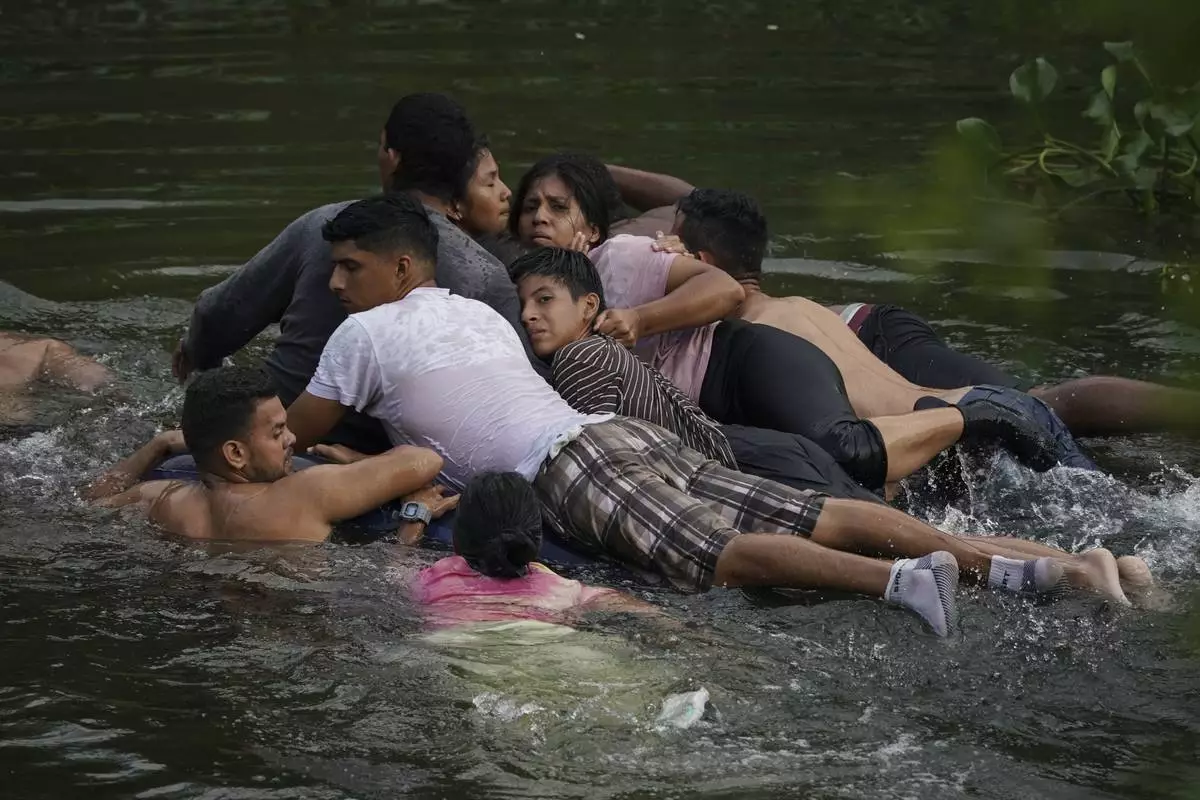
Migrants cross the Rio Bravo on an inflatable mattress into the United States from Matamoros, Mexico, on May 9, 2023. The image was part of a series by Associated Press photographers Ivan Valencia, Eduardo Verdugo, Felix Marquez, Marco Ugarte Fernando Llano, Eric Gay, Gregory Bull and Christian Chavez that won the 2024 Pulitzer Prize for feature photography. (AP Photo/Fernando Llano)
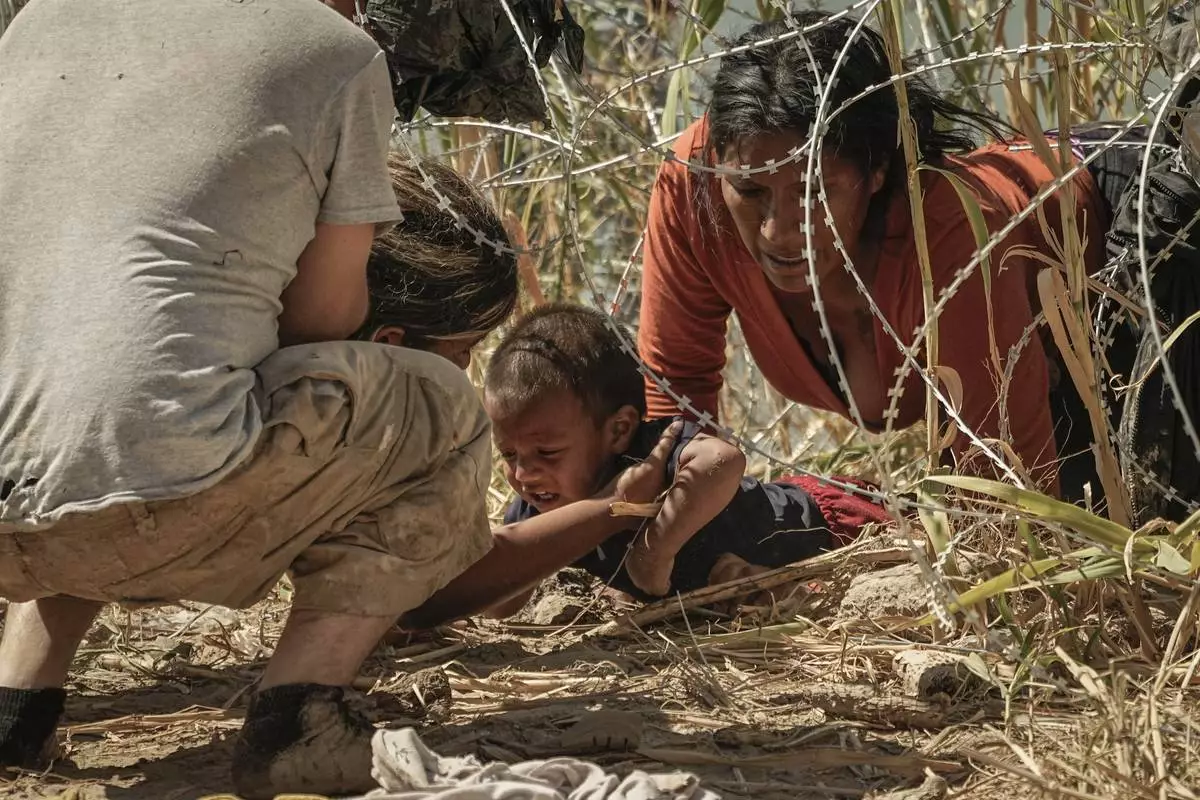
Migrants who crossed into the U.S. from Mexico pass under concertina wire along the Rio Grande river, Thursday, Sept. 21, 2023, in Eagle Pass, Texas. The image was part of a series by Associated Press photographers Ivan Valencia, Eduardo Verdugo, Felix Marquez, Marco Ugarte Fernando Llano, Eric Gay, Gregory Bull and Christian Chavez that won the 2024 Pulitzer Prize for feature photography. (AP Photo/Eric Gay)
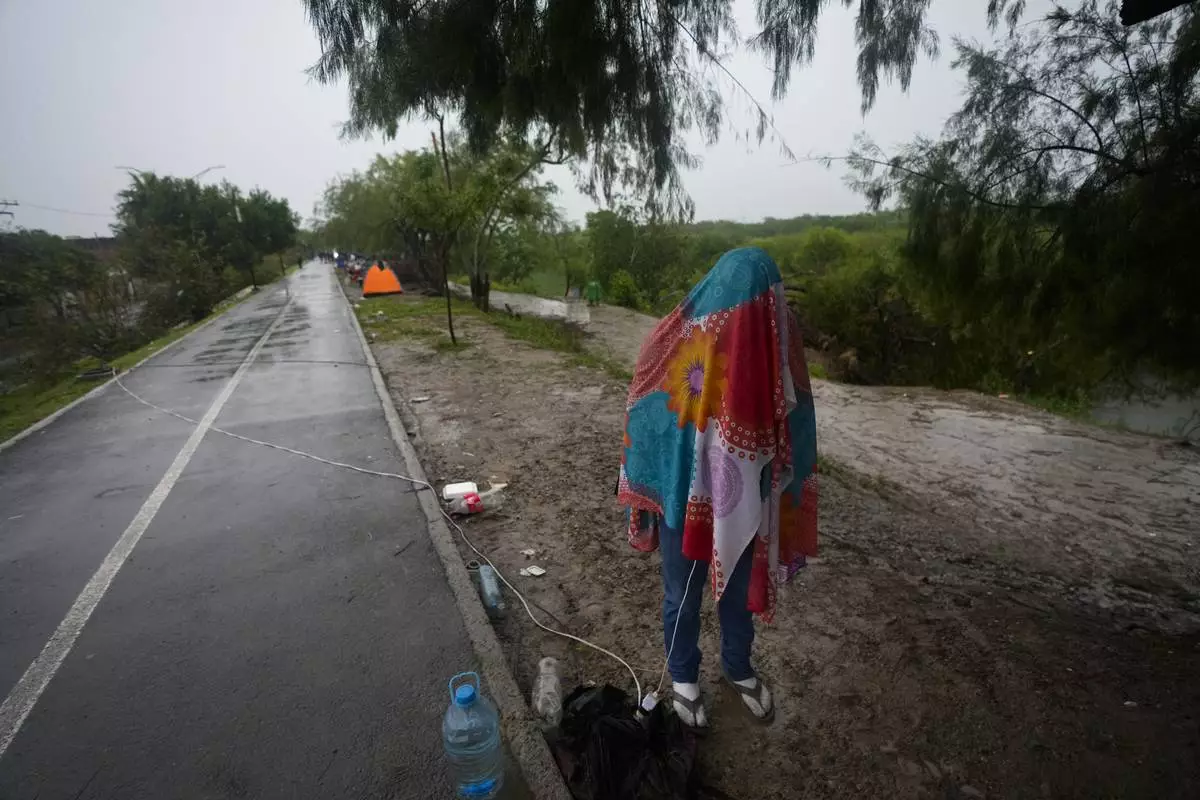
A Venezuelan migrant stands covered in a wrap while texting, on the banks of the Rio Grande in Matamoros, Mexico, Saturday, May 13, 2023. The image was part of a series by Associated Press photographers Ivan Valencia, Eduardo Verdugo, Felix Marquez, Marco Ugarte Fernando Llano, Eric Gay, Gregory Bull and Christian Chavez that won the 2024 Pulitzer Prize for feature photography. (AP Photo/Fernando Llano)
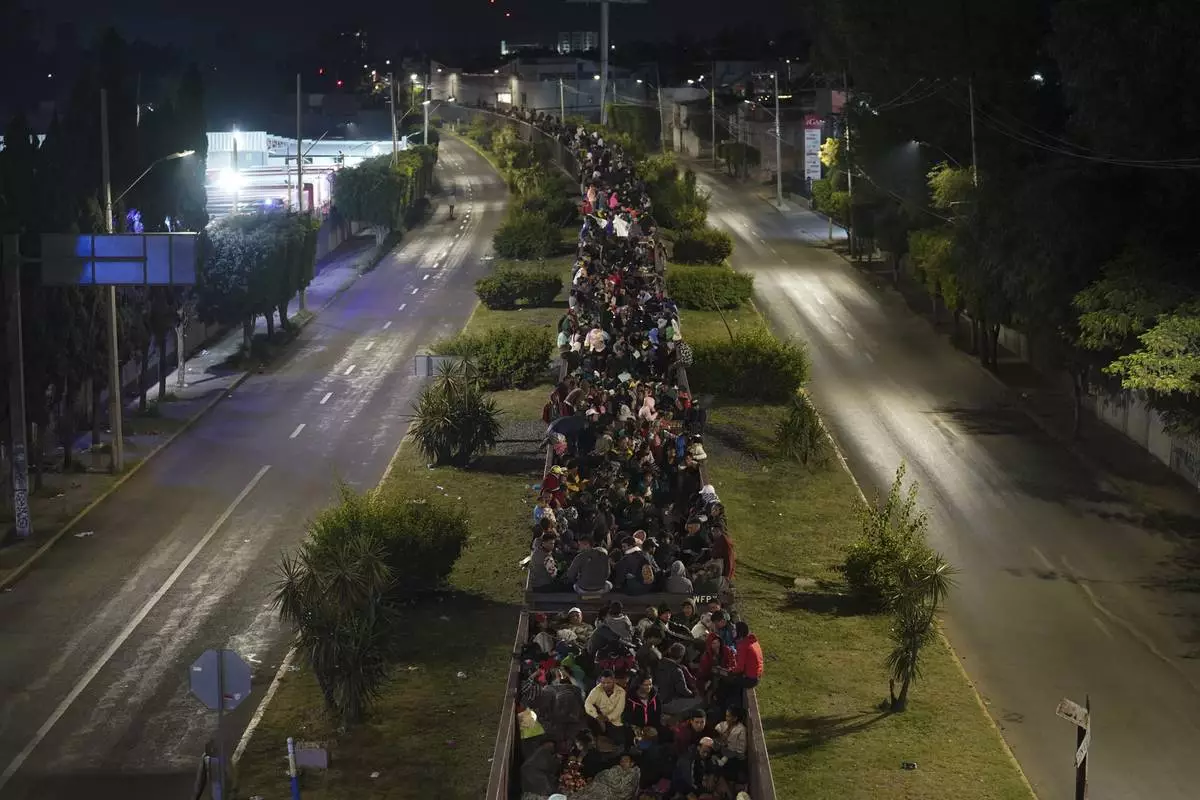
Migrants travel inside train cars of a northbound freight train, in Irapuato, Mexico, Saturday, Sept. 23, 2023. The image was part of a series by Associated Press photographers Ivan Valencia, Eduardo Verdugo, Felix Marquez, Marco Ugarte Fernando Llano, Eric Gay, Gregory Bull and Christian Chavez that won the 2024 Pulitzer Prize for feature photography. (AP Photo/Marco Ugarte)
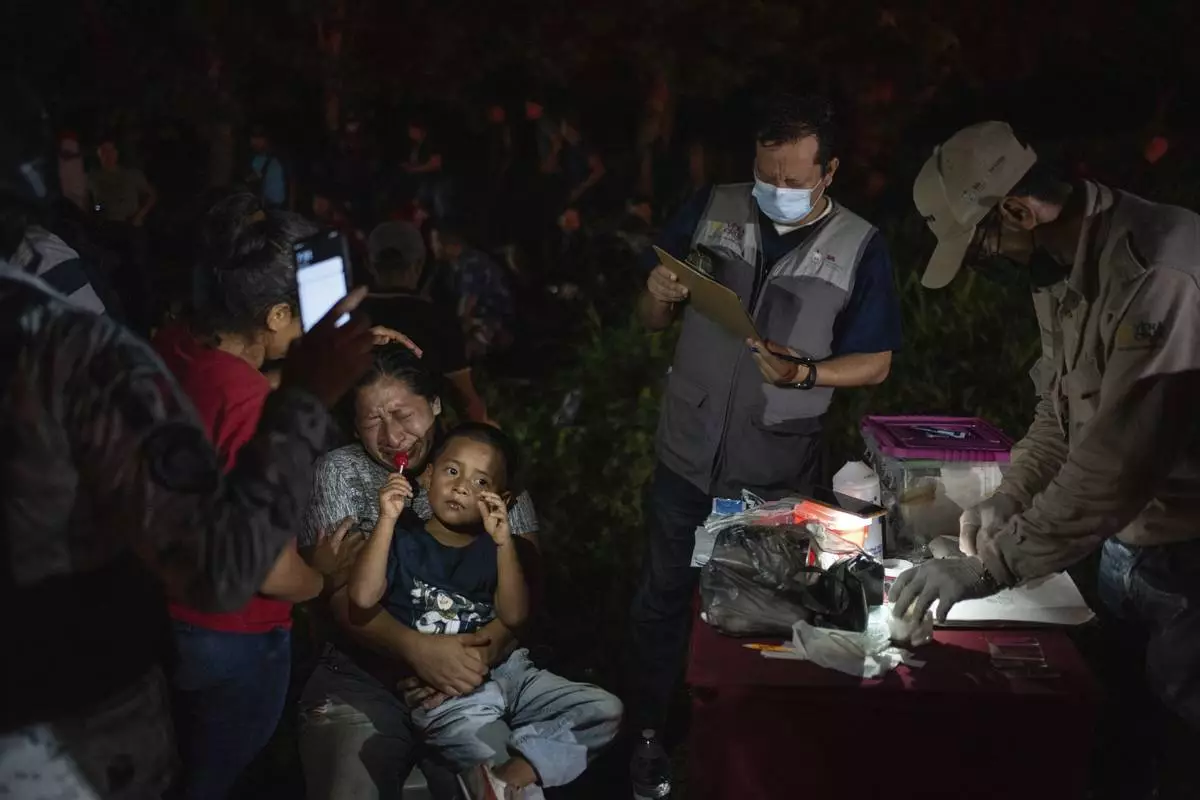
Migrants, mainly from Central America, who were traveling to the U.S. inside a tractor-trailer, are detained by Mexican immigration agents and National Guard members, in Veracruz, Mexico, Sunday, July 23, 2023. The image was part of a series by Associated Press photographers Ivan Valencia, Eduardo Verdugo, Felix Marquez, Marco Ugarte Fernando Llano, Eric Gay, Gregory Bull and Christian Chavez that won the 2024 Pulitzer Prize for feature photography. (AP Photo/Felix Marquez)

A Venezuelan migrant laughs as she jokes with her husband, who gave her a few flowers he picked in the grass, as they wait along the rail lines in hopes of boarding a freight train heading north in Huehuetoca, Mexico, Wednesday, Sept. 20, 2023. The image was part of a series by Associated Press photographers Ivan Valencia, Eduardo Verdugo, Felix Marquez, Marco Ugarte Fernando Llano, Eric Gay, Gregory Bull and Christian Chavez that won the 2024 Pulitzer Prize for feature photography. (AP Photo/Eduardo Verdugo)
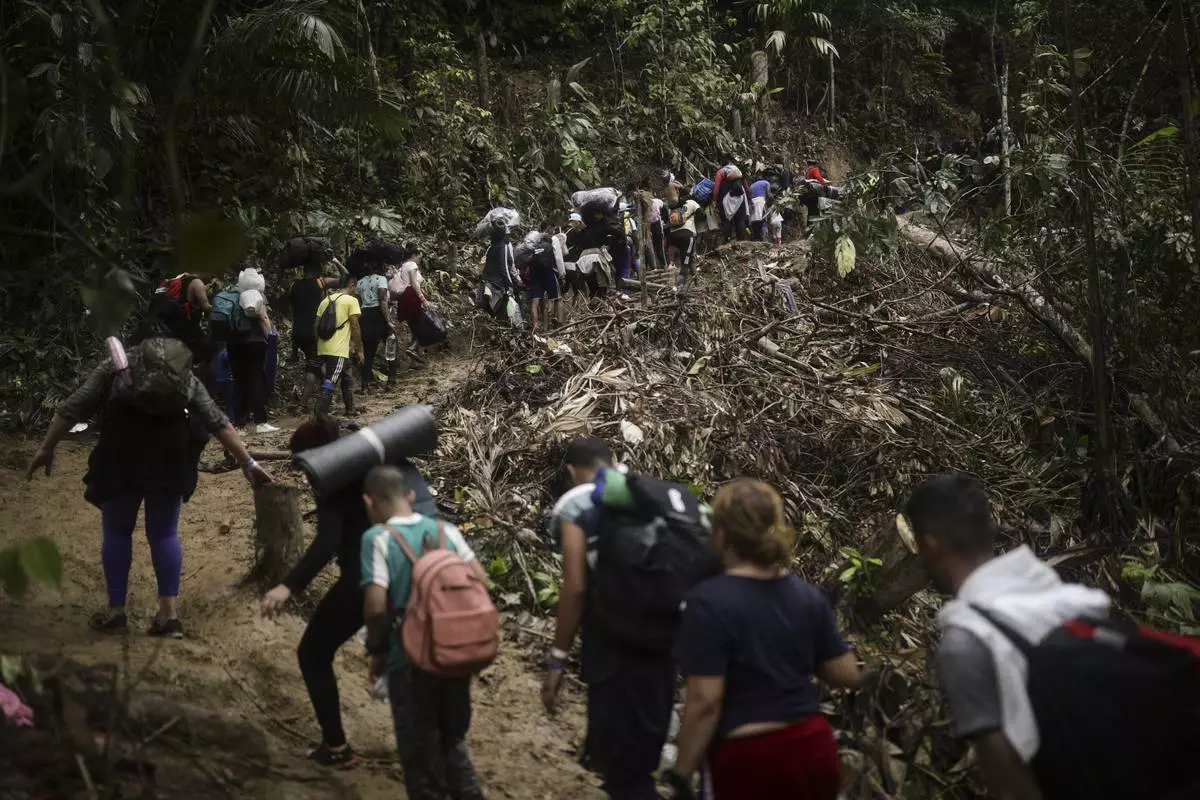
Migrants walk across the Darien Gap from Colombia to Panama in hopes of reaching the U.S., Tuesday, May 9, 2023. The image was part of a series by Associated Press photographers Ivan Valencia, Eduardo Verdugo, Felix Marquez, Marco Ugarte Fernando Llano, Eric Gay, Gregory Bull and Christian Chavez that won the 2024 Pulitzer Prize for feature photography. (AP Photo/Ivan Valencia)
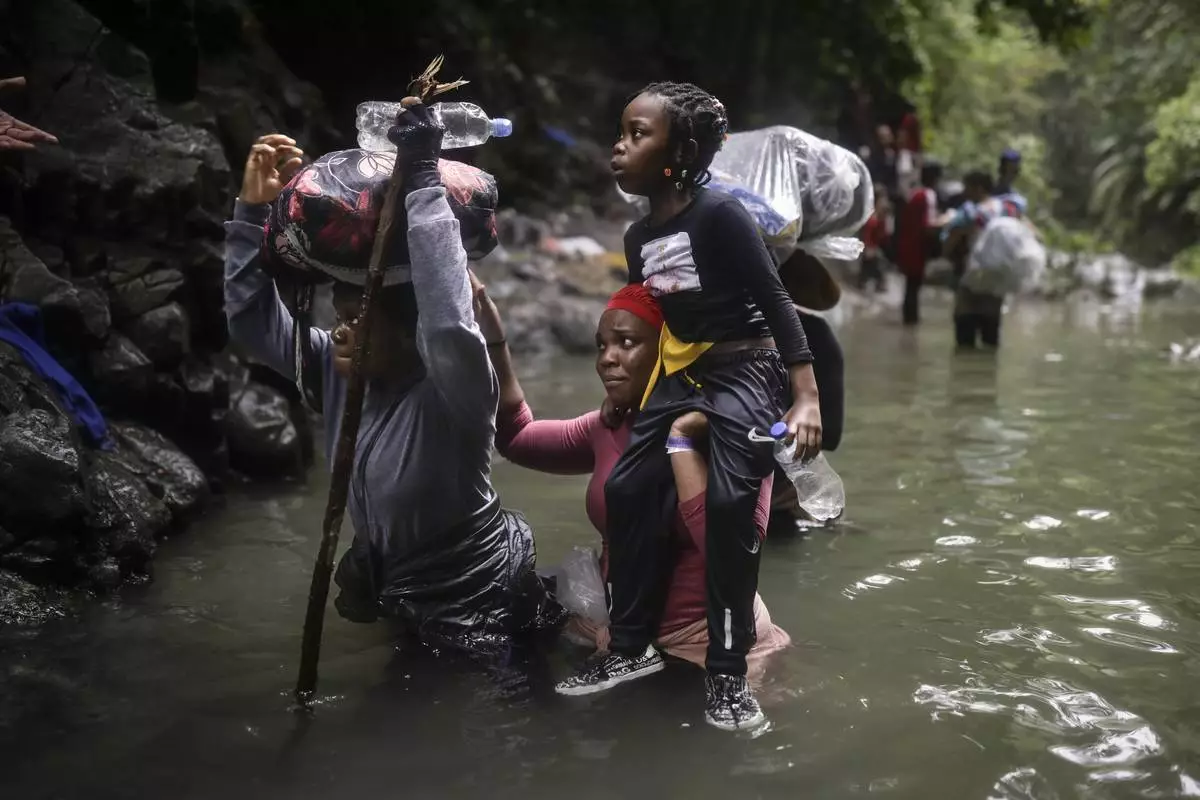
Haitian migrants wade through water as they cross the Darien Gap from Colombia to Panama in hopes of reaching the U.S., Tuesday, May 9, 2023. The image was part of a series by Associated Press photographers Ivan Valencia, Eduardo Verdugo, Felix Marquez, Marco Ugarte Fernando Llano, Eric Gay, Gregory Bull and Christian Chavez that won the 2024 Pulitzer Prize for feature photography. (AP Photo/Ivan Valencia)
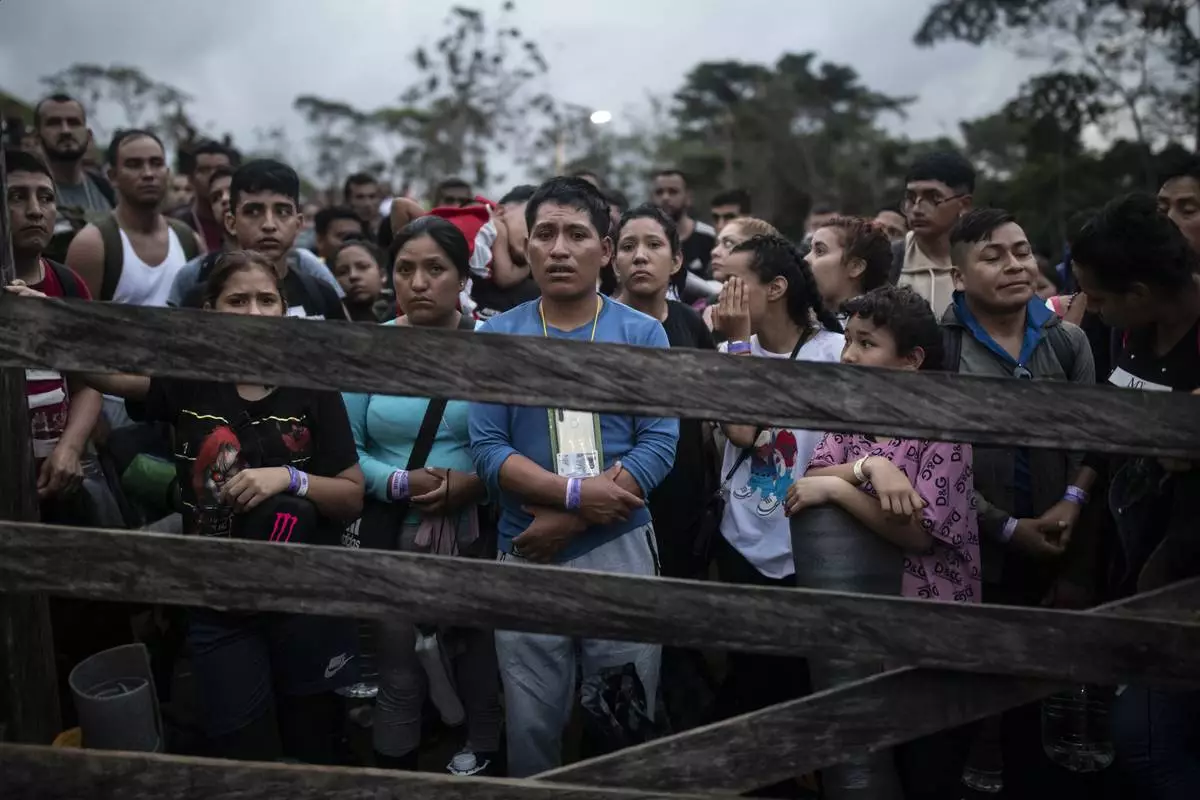
Migrants planning to start walking across the Darien Gap from Colombia to Panama in hopes of reaching the U.S. gather at the trailhead camp in Acandi, Colombia, Tuesday, May 9, 2023. The image was part of a series by Associated Press photographers Ivan Valencia, Eduardo Verdugo, Felix Marquez, Marco Ugarte Fernando Llano, Eric Gay, Gregory Bull and Christian Chavez that won the 2024 Pulitzer Prize for feature photography. (AP Photo/Ivan Valencia)
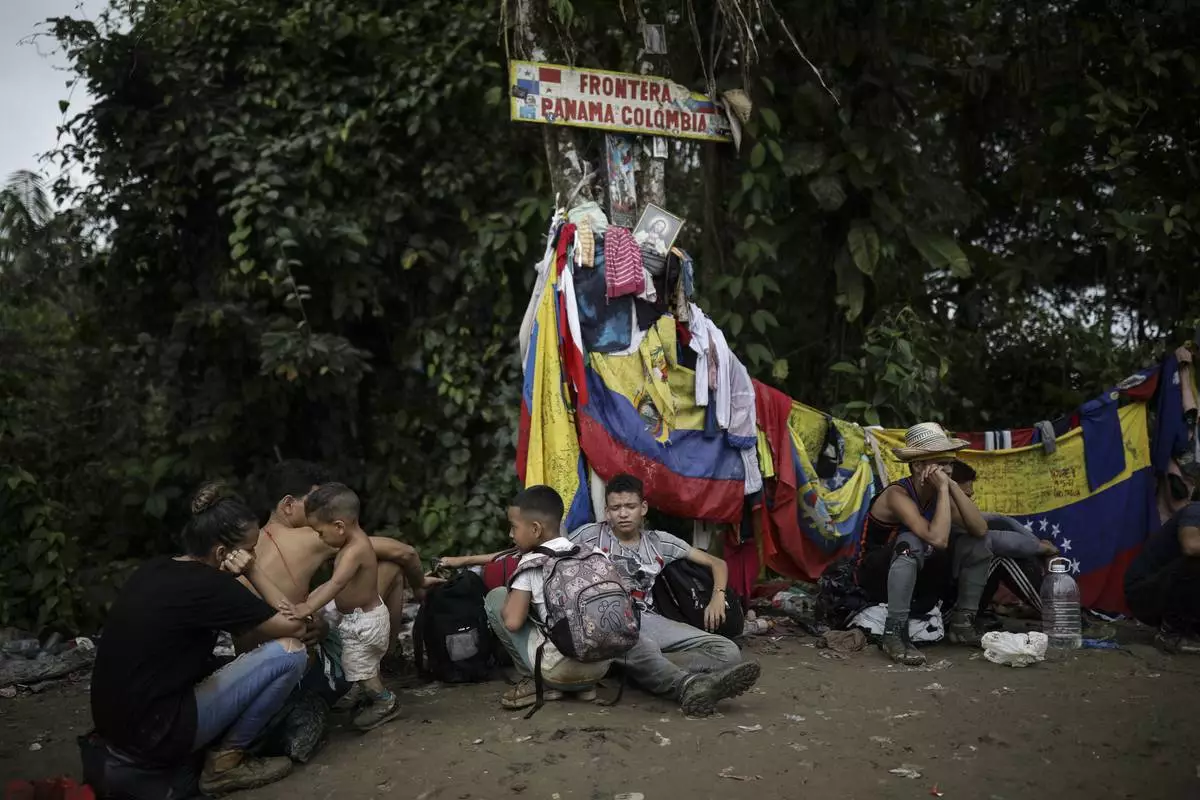
Migrants sit under a sign marking the Panama-Colombia border during their trek across the Darien Gap, Tuesday, May 9, 2023. The image was part of a series by Associated Press photographers Ivan Valencia, Eduardo Verdugo, Felix Marquez, Marco Ugarte Fernando Llano, Eric Gay, Gregory Bull and Christian Chavez that won the 2024 Pulitzer Prize for feature photography. (AP Photo/Ivan Valencia)
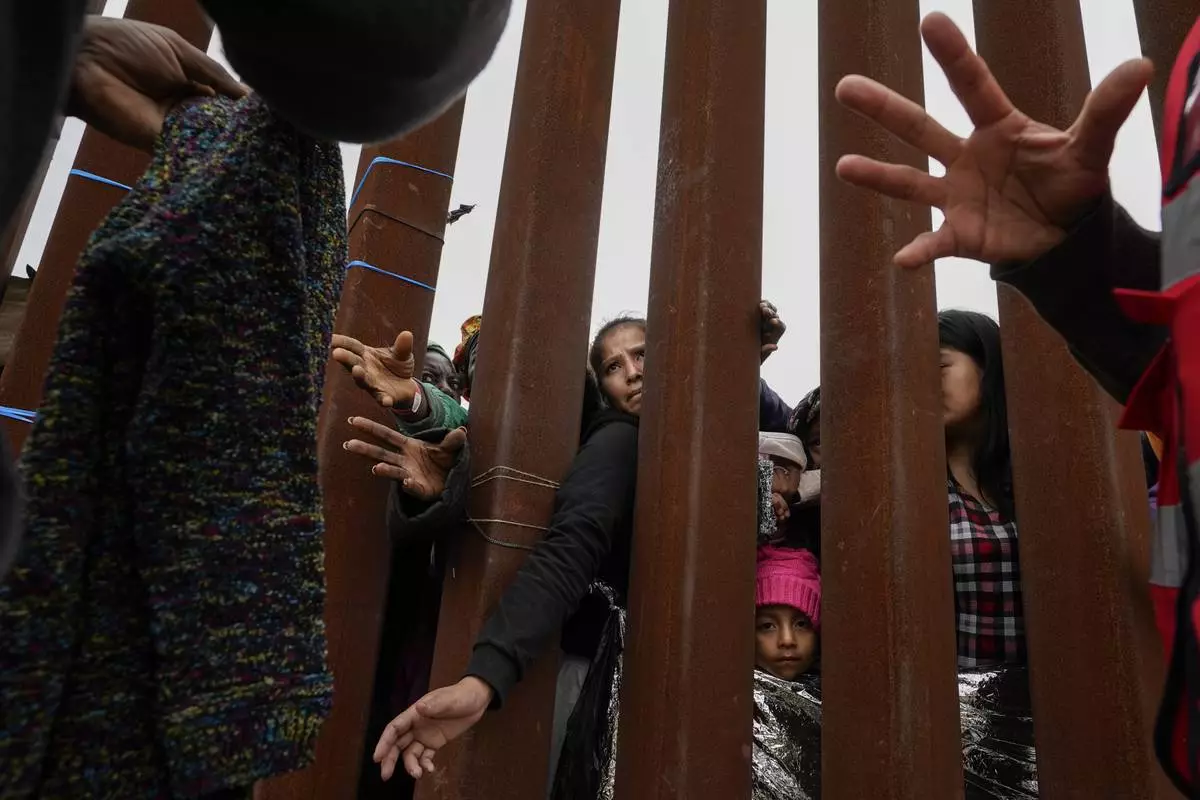
Migrants reach through a border wall for clothing handed out by volunteers as they wait between two border walls to apply for asylum Friday, May 12, 2023, in San Diego. Hundreds of migrants remain waiting between the two walls, many for days. The image was part of a series by Associated Press photographers Ivan Valencia, Eduardo Verdugo, Felix Marquez, Marco Ugarte Fernando Llano, Eric Gay, Gregory Bull and Christian Chavez that won the 2024 Pulitzer Prize for feature photography. (AP Photo/Gregory Bull)
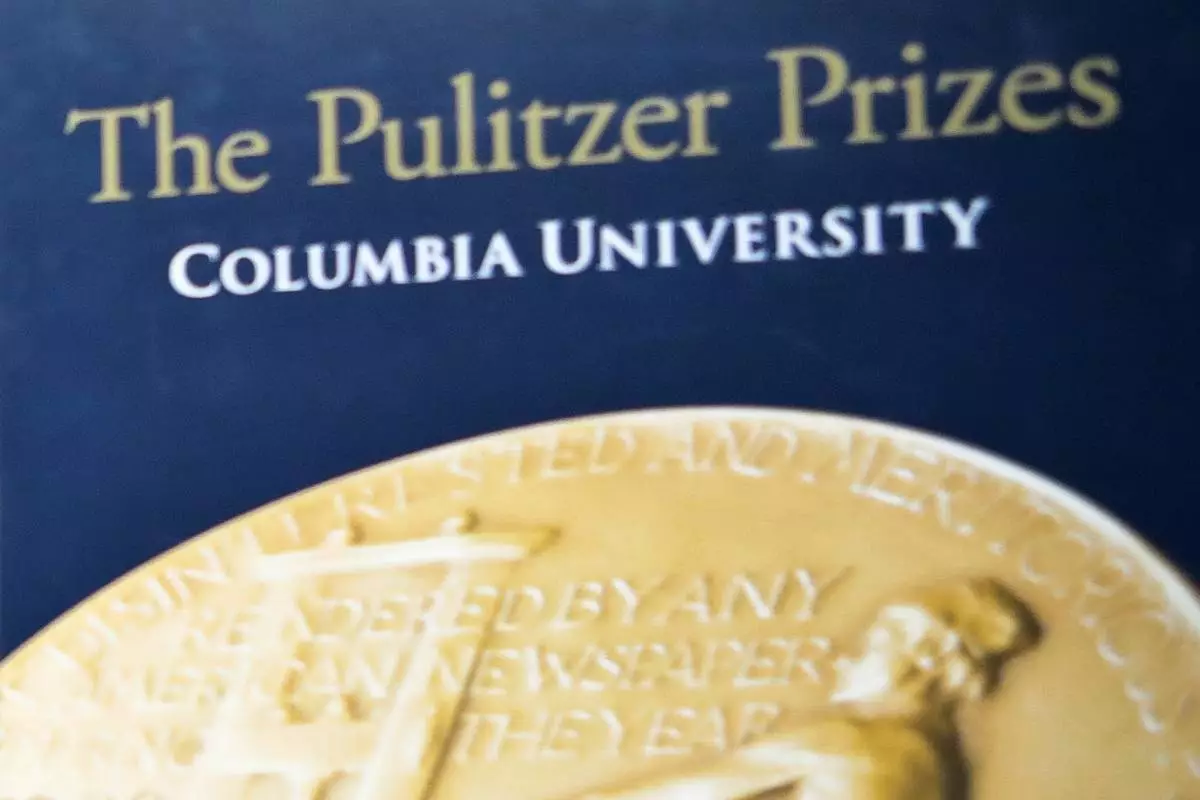
FILE - Signage for The Pulitzer Prizes appear at Columbia University, May 28, 2019, in New York. Pulitzer Prizes are due to be announced on Monday, May 6, 2024, traditionally the most-anticipated day of the year for those hoping to earn print journalism's most prestigious honor. (AP Photo/Bebeto Matthews, File)




























